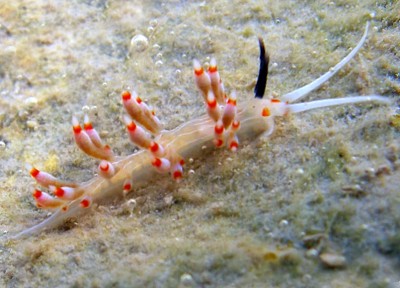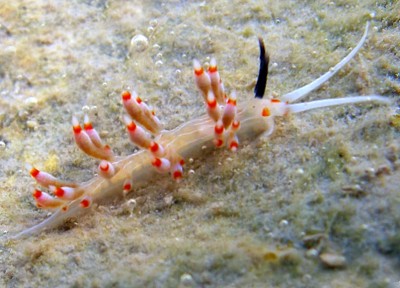
Facelina lineata
Eliot, 1905
Order: NUDIBRANCHIA
Superfamily: AEOLIDINA
Family: Glaucidae
DISTRIBUTION
Known from east Africa and India but may have a much wider Indo-West Pacific distribution.
PHOTO
Locality: Poshitra, exposed reef, Gujarat, Arabian Sea, 15 November 2009, exposed reef. Length: 10mm. Photographer: Deepak Apte.
The body is translucent with the pale orange-pink viscera showing through the body wall. There is a single median white line, sometimes broken, running from the head to the posterior tip of the foot. There are also a white line on each side of the dorsum which is broken at each ceratal cluster. There is another white line on each side running below the cerata from the head back to just below the last cerata. On the head are three large orange-red patches, one in the dorsal midline and one on each side of the head in line with the rhinophores. The rhinophores are black with a white tip. In Crossland's colour painting on which Eliot relied for his external description the black rhinophores appear to be perfoliate but this may just be the way Crossland painted them as Eliot is unable to determine leaflets in the preserved specimen, there are no sign of them in the Gugarat specimen, and the rhinophores were smooth in 4 specimens I found in Tanzania. The cerata are a pinkish orange colour from the digestive gland contents, the only colour on the ceratal wall is a orange-red subterminal band. Another apparent error in the original description is the depiction of the dorsal white lines, the painting showing 4 continuous lines. In the material I am familiar with there are only 3 lines as described here.
This is one of two similarly coloured species described by Eliot (1905). Deepak Apte's photo from Gujurat is identical in colour to Facelina lineata [Pl. XVI fig. 4.]. The second species, Hervia lineata [= Cratena lineata] is also illustrated on Plate XVI, in fig 2.
It is possible that both these species belong in the same genus, which means that one would need to be given a new name. At this stage I will leave this species as Facelina lineata although it is unlikely to belong in that genus.
- Eliot, C.N.E. (1905). On some nudibranchs from east Africa and Zanzibar. Part VI. Proceedings of the Zoological Society of London, 1904(2): 268-298, Pls. 16-17.
Rudman, W.B., 2009 (November 23) Facelina lineata Eliot, 1905. [In] Sea Slug Forum. Australian Museum, Sydney. Available from http://www.seaslugforum.net/find/faceline
Related messages
Facelina lineata from Gujarat, India
November 24, 2009
From: Apte Deepak

Dear Dr. Rudman
We got this interesting species yesterday at Poshitra reef, type locality of Sakuraeolis gujaratica. Black rhinophores are so distinct. Can you help identify?
Locality: Poshitra, exposed reef, Gujarat, Arabian Sea, 15 November 2009, exposed reef. Length: 10mm. Photographer: Deepak Apte.
Deepak Apte
spiderconch@gmail.com
Dear Deepak,
It is nearly 40 years ago since I was in the Gulf of Kutch - and as I discovered, June was the wrong time of the year. Most sensible opisthobranchs had left for cooler climes. Sakuraeolis gujaratica was one of very few finds my wife and I made.
Your animal is Facelina lineata Eliot 1905 which was described from East Africa. I found 5 specimens identical to yours in Tanzania in the 1970s. Unfortunately Eliot described another very similarly coloured species in the same paper as Hervia lineata, which I am calling on the Forum Cratena lineata. If they turn out to belong in the same genus then one will need a name change. However until we work out just how many white-lined species there are with red marks on their head, new names are probably best left as there are possibly a number of existing ones which could be used.
For example Baba (1949) illustrates an animal he identifies as Hervia lineata but it differs from Eliot's description in having a central red spot on the head as well as the lateral ones, as found in Facelina lineata.
This is an interesting addition
Best wishes,
Bill Rudman
